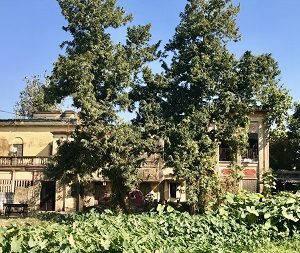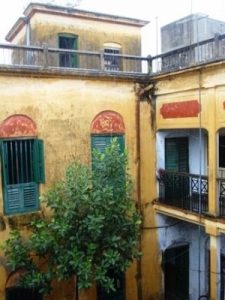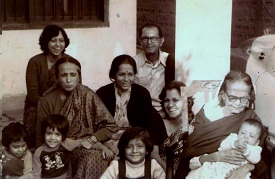When I look back on my earliest memories of childhood, I always see my all-white sari clad, completely unadorned, hair pulled back into a severe knot if not covered in a crisp ghungat1, ivory-like-parchment skinned grandmother as the central figure in both the immediate and extended family. That is rather odd considering that she did not live with us till I was quite a bit older. She may have been diminutive, but she was certainly the voice of quiet authority without ever raising it – respected by all and feared by some amongst those who knew and loved her!
I was born rather late to my parents; my mother was thirty-six, my father was forty-eight, my sisters were sixteen and twelve, and my paternal grandmother must have been well over sixty. So, I am a little fuzzy about the details of her early life.
My memories of her begin as being this old but a fascinating person who was an institution by herself and that there was no one quite like her! She was Nina to all her grandchildren, great grandchildren and great great grandchildren. That name was given to her by her eldest born grandson from her daughter who lived in Delhi at the time; so, I am guessing Naani became Nina at some point. That ageless name suited her to perfection. She was no indulgent, doting and gentle mother, mother-in-law, aunt, grandma or great grandma! She was one feisty woman you just could not ignore! On one hand she was a widow de rigeur in a typical Bengali upper middle-class household, wearing white (even her shawls in winter were either plain black or plain grey with no embroidered borders), pure vegetarian, following every fast there was in the book. If she was with us and sitting at the same table, we had to keep ourselves and the food (even the rice) we ate, at an arm’s length from her !

My grandfather died the year before I was born so I cannot say with certainty that she gave up what she did for sheer love for him, though he pretty much let her do as she pleased which was rather unusual for that generation! Every puja2 that was performed by her mother-in-law was faithfully arranged by her with dedication and with the same amount of personal preparation in our ancestral home in Naihati3 where she lived and which she loved with a passion. The puja was always performed by the family priest whose family had been employed by the Ghoses over generations; she could never do it herself because she was not a Brahmin. On the other hand, she was fearless, gutsy, spoke her mind, stuck to her principles (I thought they were dogmatic sometimes and dared to tell her so); she had educated herself and had not only clandestinely participated in the nationalist movement though her husband worked in the police department, but had also managed to enlist his help occasionally for freedom fighters on the run; had Muslim friends who were invited over and whose houses she visited, and as far back as I can remember lived life on her own terms. It was not easy on my mother. But it was remarkable for a woman in those times to live the way she did, with her dignity intact. She must have faced a lot of opposition. But she never spoke about them.
Kanak Nalini Ghose (her married surname) was born before the turn of the last century around April 1892 and spent her early years quite comfortably with her parents and siblings in Moradabad, in eastern UP where her father was a practicing lawyer. She was very proud of her ‘paschime boro hoya’4and confidently spoke the most appalling Hindi one can imagine that she practiced with great effect on our hapless Man Friday, Joggeshwar and on the Bartanwalis5that came to the door, numbing all to silent obedience! When her father died, her mother and the younger siblings had to move to Kolkata to her mother’s brother’s house and the economic situation somewhat changed. I think her love of austerity and thrift began from this experience. She was married off at the age of fifteen or sixteen to the eldest son of a matriarch who benevolently managed a small zamindari6 in Naihati after her husband’s early death. The extended family was huge, the sisters-in-law came home for delivery, came home after being widowed, or left some of their boys behind to be brought up in the Mamar Bari 7. There were other distant family members who came in distress for job recommendations from my great grandmother, my grandfather and his brothers, one an army doctor another a businessman (the fourth son was still in university); there were always land tenants who came seeking help. Consequently, the household was run in a pretty egalitarian manner, almost like a hostel.
-

Inside the House - It may have been a zamindari but there were no trappings of luxury that we associated with our grandmother’s family, no gilt-edged Belgian mirrors, no Italian marbles and certainly no sparkling chandeliers! My grandmother was thrown into this chaotic household and as the eldest daughter-in-law ran it like a military camp. For her family was everything. She also accompanied her husband when he was posted out of station, found an enlightened freedom fighter in Chittagong Port City, a gentleman who later became known as Ohm Baba whom she adopted as her Guru, persuaded her husband to help set up his ashram in Dibrugarh8, visited his ashram regularly, alone or with one of her widowed sisters-in-law who also accepted him as Guruji. How she managed her equally independent minded mother-in- law remains a mystery. She would not divulge!
My grandmother’s only weakness was her son, my father. Sometimes the preference between the son and older daughter, or favoritism amidst all the other family members was pretty obvious. Her daughter, my pishima,9 and a very independent and feisty woman herself, made no bones about it even while she and her brother shared a very close bond. Now I think I understand her better. She lived and breathed for her family and he was the only one who carried the family name to the next generation. Amongst her husband’s four brothers, my father was the only son, the last of the Ghoses. She wanted to instill in him all that she held dear, and he remained her lifelong ongoing project! Even though life in Naihati was very spartan, she worried that as the only heir he would be spoilt rotten by his father, uncles and grandmother. As a result, he was packed off to live in the ashram in Dibrugarh from the tender age of eight, coming home only twice a year during school holidays. In that bitter cold all he was ever allowed to wear was a dhoti and a shawl, and because he had small hands, his daily task in the ashram was to clean the insides of the glass chimneys of the kerosene lamps that illuminated the ashram at night. That discipline, that self-sufficiency, and attention to detail remained with him his entire life, though he returned to Naihati at fifteen to appear for his matriculation examination. That his ashram sojourn turned him into an agnostic is another story! She also stopped him from marrying the woman he fell in love with when he went to study in England because as the only son and heir, he had to come back home to carry on the Ghose traditions. That is yet another story!
-

Nina and I-happy times together - When she visited our home in Kolkata and I was little, she would put me to sleep with lullabies, not the usual nonsense rhymes for little children, but Sanskrit slokas10. She did not have much of a singing voice, so it was clever of her not to sing, but the beautiful rendition of those repetitive prayers and its cadence and words have stayed with me to this day. Though she never performed any puja herself she would sit behind the purohit, or his son or his nephew on her little cane mora11 correcting their Sanskrit pronunciation and pointing out with the stick of her hand fan if he stumbled over any of the processes. It used to be quite amusing to watch. Nina was always very proud of her Sanskrit prowess and often told us the story of how she received the prize for coming first in Sanskrit from none other than the beautiful Lady Curzon. It was much later when we were studying Indian history in school that I realized that she received that prize as a mere child! She definitely did not continue her formal studies after marriage, possibly was stopped even before that, after her father died. Yet she was a voracious reader, read and studied a lot of religious texts in depth, could hold her own on any discussion on Vedanta, Buddhist and Gandhian philosophies with intellectuals. She must have found the time to educate herself. Buddhism especially was like her research topic (worth a Ph.D), so well had she researched and studied about it. A corollary to this was that all her immediate grandchildren and most of her great grandchildren were named by her. All the names had beautiful and symbolic meanings but some of us landed up with really difficult ones to pronounce or spell, instances being Jataveda, Prajna Paramita, Pracheta (a boy)!
Gossip was considered a trivial pursuit and laziness abhorrent. I cannot remember her sitting idle, chatting, with her hands on her lap. Usually she was either crocheting or knitting. Unless someone bought her new wool, she was always recycling old sweaters. How I hated to be collared to unravel the wool and roll it up in a ball. She would turn out the most exquisite crocheted items from threads retrieved from cotton swabs used for industrial cleaning! Not that she had much use for the finished products; they were given away to whoever wanted them. When she visited us from Naihati staying a month at a time, the house would be full of relatives coming to visit her. Though she was happy to meet them, all the idle talk exhausted her, and finally she would pine for the solitary splendor of living alone in Naihati and would return to it.
-

One of the ponds belonging to the house - As far as I can remember, the sprawling house in Naihati with its aam bagan12, its vegetable garden, its dighi13 and its two cows had only two permanent residents Nina and Chordadu, my grandfather’s youngest brother. There was the caretaker Biru bhai and his wife Bou, and my grandmother’s girl Friday, Hajari. The halcyon days were over, the zamindari was gone, some of the land had been taken away, the extended family had died, diminished and scattered. Though I heard with awe the wondrous stories I did not feel the difference. I loved the open spaces, the trees I could climb, the flowers I could pick. Chordadu’s library was Aladdin’s cave, the cow called Mona was a nightmare best observed from a safe distance, summer afternoons were perfect to steal into Nina’s stock of heavenly homemade pickles! When my grandmother wasn’t in Kolkata, we visited her almost every weekend. As time marched on, those moments also came to an end.
But it certainly was not all gloom and doom. At the age of seventy and more Nina traipsed off to do pilgrimage to Kedarnath Badrinath14with her daughter and friends. Some years later my sister took her to her home in Bangalore and thereafter to do pilgrimage to Tirupati15. Nina decided she liked navratan korma and avarakkai 16 very much! This from a person who considered eating at restaurants and going on holidays to be complete waste of money!
-

Nina with the family including some of her grandchildren, great grandchildren and great great grandchildren - Nina guarded Naihati with her life as long as she could. During the turbulent Naxalite period17 she lived all alone with one maid, and had firebombs thrown at the house in the cover of darkness. It happened once after Diwali when I was there with my parents. It was petrifying. But my grandmother did not crumble. She challenged them to come forward and show their faces and of course no one dared. She probably knew each of the miscreants very well! When she finally came to live with us permanently, my sisters had both flown the coop, so Nina and I shared a bedroom. She needed help at night. We argued a lot, over so many things. I still remember she called me a mlechha 18 once in exasperation, and once a kulangar 19! I laughed at the former, I felt guilty of disappointing her for the latter. Though she was ailing with age related issues, she died just as she lived, without a fuss. Just a deep sigh.
That was thirty-seven years ago. And I still marvel at the multi-faceted and immensely talented woman my grandmother was, a woman of flesh and blood. At fifty-eight, having just become a grandmother, I am reminded forcefully that I do have a tough act to follow!
Prajna Sen lives in Kolkata. She travels widely and is a freelancer writer.
Footnotes
- Veil
- ceremonial prayers
- A small suburban town about 44 km north of the city of Kolkata
- Being brought up in the western India
- Women peddlers of utensils
- Land-ownership
- House of the maternal uncle. Referred to mother’s natal home
- City in the province of Assam in north-eastern India
- My paternal Aunt
- Verses from scriptures
- Stool
- Mango Orchard
- Large pond
- Temples of Shiva and Vishnu, revered places of pilgrimage in the Himalayas
- Temple in Seem Andhra, a province in Southern India
- Vegetarian delicacies popular in Southern India
- In the 1970s, a period of student unrest and rural uprising in eastern India, particularly West Bengal and Bihar
- A derogatory term for persons with different ways of living
- Someone who shames the family

Fabulous! I can almost see her! And the life she led , the world she saw changing before her eyes, must have been something momentous! and do tell us a little more about her son and what he thought of growing up in an ashram in Dibrugarh. Lovely happy read. Thank you.